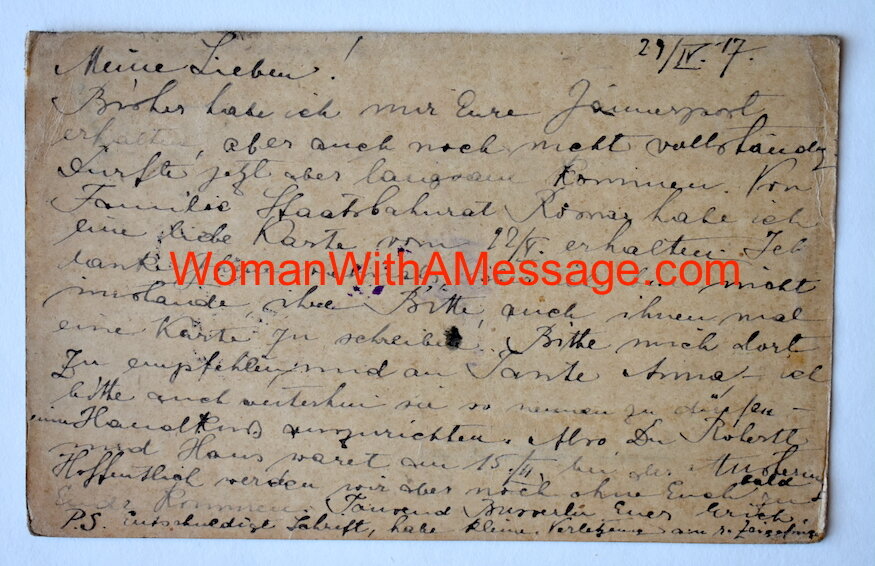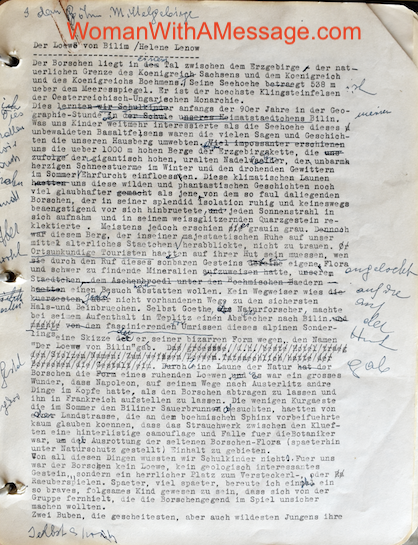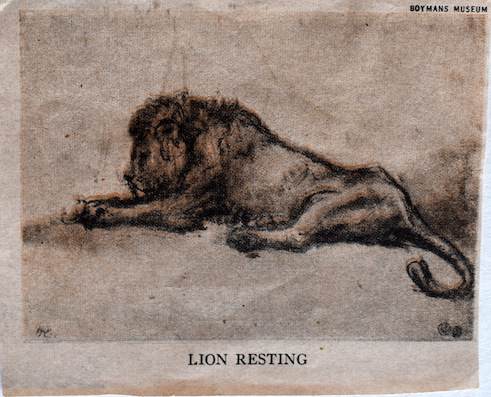We, the school children, knew nothing of this. To us, the Borschen was not a lion, and was of no geological or botanical interest. It was just a splendid place to play hide and go seek, and (cops and) robber games. Later, much later, I deeply regretted having been such an obedient child who stayed away from the group who, even just in play, wanted to harm the Borschen region.
Two boys, the brightest but also the wildest in their class, were the ringleaders. Their names were Ottl Kurz and Attl (Arthur) Kurz. (The last name means “short”). They were the smallest kids around, but they were such daring rascals that older, bigger kids respected them. The Kurz boys’ boldness seemed more important than the ten to fifteen centimeters in height that the older boys had on them. While the other boys saw what a great place the Borschen area was for their robber and war games, the Kurz pair were absolutely bewitched by it. They knew every nook and cranny. If the Borschen had attracted a wider audience, they would have made fine tour guides. But that never happened, and so the Borschen remained the favored place of these children, even as they grew older. Later, as university students, they would hike up there with their textbooks, still feeling some kind of magnetic attraction to the place, as a criminal often feels drawn to the scene of his crime. They always went to this place, even though it could have been disastrous for them. But I’m getting ahead of myself.
During summer vacation, Ottl and Attl Kurz left the house at 6 a.m. to go to their Borschen, which always had something new to show them, like in the Thousand and One Nights.
These boys’ parents were used to these escapades, and did not worry when their roguish boys – whom they impersonated at times - came home a bit late from the mountain, hungry as bears. But when it got to be 9 o’clock, and their boys still had not come home, they started to worry. They notified the police, and tired miners and field hands who heard the rumor also joined the search. It’s strange how popular these young rascals were.
The search was only carried out in the immediate area of the Borschen. Searching the forests and the nearby spa was deemed unnecessary. After a two-hour search, aided by the full moon, the boys were found, unconscious and with several holes in their heads, in a deep chasm. They were transported to the hospital on a hay wagon.
At that time, I was no longer in my home town; I lived in Vienna. I heard of the tragedy that had befallen the rascals some twenty years later, when I ran into Engineer Kurz in the revolving door of a Viennese café. We greeted each other, laughing, as if we had just seen each other recently.
“Hi there, HE. Still the same?” The two letters had a double meaning. They were my nickname, but in the Bilin dialect they also meant “crazy”. And Mr. Kurz did intend that double entendre! He grabbed my arm. “Are you expecting someone? Really, you’re not? Then we can sit at the same table.”
“Ottl Kurz, you still haven’t grown up!”
We sat together for several hours, putting everyone down – the locals, the bigwigs. We thought the entire population, including us, was just a bunch of characters. For the first time, I realized that it bothered Otto that he was so short, or at least it had bothered him in his younger days. He told me – and he was lying – that his claustrophobia, which he really did have as a result of the disaster at the Borschen, had made him unfit for military service. He thought he could help the fatherland more by thundering on about war, complaining about the war economy, the victors, and so on. He could disguise his claustrophobia as a mental illness.
I laughed at his humor, but also felt great sympathy due to the insights into his psyche which he had shared with me. I decided to be nice to him and take care of him, even though he kept teasing me. His way of making fun of his own shortcomings was the best type of gallows humor. After the waiter interrupted us, I decided to change the subject:
“Hey, why don’t you tell me about the robber show incident? I wasn’t living at home by then.”
“Yes, it really was quite a while ago; now, our last rascal prank is mentioned in the new editions of school books as a warning about what not to do. Now, 20 years later, I still don’t know how we two got home. We were running around showing off our battle scars, with our heads bandaged. We were particularly excited about being excused from school for a whole year! That alone was worth the whole adventure.
I can still remember, as if it had happened yesterday, what happened to me just before we fell down the chasm. Attl, who was a year younger than I, but a centimeter taller, was the daredevil. He stood up on a sharp pinnacle and, making a megaphone with his hands, hollered to me: “Come on up here, Ottl, and look at all this splendor! Not even Lobkowicz has these specimens in his botanical garden. Come smell the fragrance!” I suffered a crippling panic attack. Such splendor could only be found in a dangerous steep overhang; anywhere else, all the rare flowers would already have been picked. Before I could reach him or even warn him, Attl disappeared without saying a word. I called his name; no answer. Gathering all my strength, I screamed: Attl, I’m counting to three and then I’m coming to get you!
The end? I’m sitting here with HE, drinking, in pleasant company, a brown liquid. The coffee of Saxony in the olden days seemed like nectar in comparison. Now, I live in Vienna, the city of song and love.
Attl lives in Germany. He is the main chemist at a dyehouse in Wuppertal. On a business trip before the war, he met a tall, beautiful woman, fell in love with her, and they are happily married. They have two children who are almost as tall as he is, and he is very proud of this. I am, as you may know, since we have acquaintances in common in Vienna, still in service to the Emperor and the King.
“Why don’t you do as Attl did?”
Well, I had more holes in my head than he did, and maybe that’s why I haven’t been able to make the decision to give up the single life. And you? Why are you still single? Are you really not married yet?
“That’s not going to change.”
When you left our home town, people thought you were a little “he” {crazy]. But you didn’t even fall down the Borschen.
I know people were saying things about me, but not that I was crazy. They were saying I had a screw loose because I went to live in Vienna to work and study. The first worked out: I found a job that suited me, but I didn’t have the time or the money for further studies.
Maybe things will change for you eventually. Sometimes our status changes.
If that was an offer, I’d have to say, we are too similar to attract each other.
Who said anything about attraction?
Too bad there’s no more room for another hole in your head. I’d be glad to make another one for you.
Otto laughed out loud. “That sounds almost encouraging. A dressing down, the kind you almost can taste. Maybe you’ll reconsider.”
If you really want to get married, maybe I can be of help. I have a friend. She’s an unusually charming person, and she likes “originals”. If you come to this coffeehouse again, I’m a regular here, and she is sure to be here, too.
In Spring 1919, I received a picture postcard of Borschen, from my friends Fanny and Otto. They were on their honeymoon. I sent them my congratulations, asking if the Borschen didn’t make the claustrophobia act up.
A second card came: “On a good roadway, we came quite near the place I almost lost my head. Fanny was disappointed not to find a shrine to the famous explorer. She would have liked to marry a famous man. I told her that if I had died and then been carted away from there, then I would have been famous. She assured me that she is happy to be married to a man who isn’t famous; that is better than not being married. The Borschen now has a kiosk that reminds one of the ones in Vienna, but the refreshments are better tasting.
How are you doing – until next time? Don’t be “he”, He. Do what we did.










































